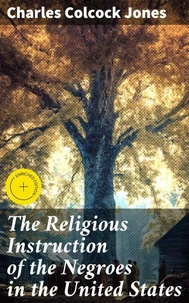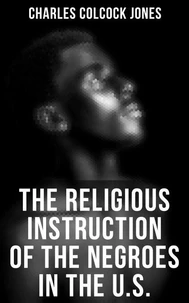The Religious Instruction of the Negroes in the United States
Par :Formats :
Disponible dans votre compte client Decitre ou Furet du Nord dès validation de votre commande. Le format ePub est :
- Compatible avec une lecture sur My Vivlio (smartphone, tablette, ordinateur)
- Compatible avec une lecture sur liseuses Vivlio
- Pour les liseuses autres que Vivlio, vous devez utiliser le logiciel Adobe Digital Edition. Non compatible avec la lecture sur les liseuses Kindle, Remarkable et Sony
 , qui est-ce ?
, qui est-ce ?Notre partenaire de plateforme de lecture numérique où vous retrouverez l'ensemble de vos ebooks gratuitement
Pour en savoir plus sur nos ebooks, consultez notre aide en ligne ici
- Nombre de pages189
- FormatePub
- ISBN859-65--4739395-5
- EAN8596547393955
- Date de parution13/11/2022
- Protection num.Digital Watermarking
- Taille521 Ko
- Infos supplémentairesepub
- ÉditeurDIGICAT
Résumé
In "The Religious Instruction of the Negroes in the United States, " Charles Colcock Jones addresses the vital role of religious education among enslaved African Americans in the antebellum South. Written in a didactic tone, the book illuminates the unique challenges faced by both enslaved individuals and their religious instructors, emphasizing the moral imperative for their spiritual upliftment.
Jones combines theological insights with practical guidelines, advocating for a more inclusive and compassionate approach to evangelizing at a time when racial hierarchies dominated societal norms. Provided within its pages are accounts of the resilience of Black faith amidst oppression, positioning the narrative of spiritual instruction at the intersection of religion and social justice. Jones, a prominent Presbyterian minister and missionary, was deeply engaged in the Southern religious revival movements of the 19th century.
His personal experiences and observations of both the plight and the potential of enslaved individuals shaped his views on their spiritual needs and rights. His work reflects a broader theological discourse of the period, with an emphasis on moral responsibility that sought to reconcile the institution of slavery with Christian ideals. I highly recommend this seminal work to scholars and general readers alike, as it offers profound insights into the complexities of faith, race, and morality in American history.
Jones' thoughtful synthesis of religious conviction with social conscience serves not only as an essential historical document but also as a foundation for contemporary discussions on race and faith.
Jones combines theological insights with practical guidelines, advocating for a more inclusive and compassionate approach to evangelizing at a time when racial hierarchies dominated societal norms. Provided within its pages are accounts of the resilience of Black faith amidst oppression, positioning the narrative of spiritual instruction at the intersection of religion and social justice. Jones, a prominent Presbyterian minister and missionary, was deeply engaged in the Southern religious revival movements of the 19th century.
His personal experiences and observations of both the plight and the potential of enslaved individuals shaped his views on their spiritual needs and rights. His work reflects a broader theological discourse of the period, with an emphasis on moral responsibility that sought to reconcile the institution of slavery with Christian ideals. I highly recommend this seminal work to scholars and general readers alike, as it offers profound insights into the complexities of faith, race, and morality in American history.
Jones' thoughtful synthesis of religious conviction with social conscience serves not only as an essential historical document but also as a foundation for contemporary discussions on race and faith.
In "The Religious Instruction of the Negroes in the United States, " Charles Colcock Jones addresses the vital role of religious education among enslaved African Americans in the antebellum South. Written in a didactic tone, the book illuminates the unique challenges faced by both enslaved individuals and their religious instructors, emphasizing the moral imperative for their spiritual upliftment.
Jones combines theological insights with practical guidelines, advocating for a more inclusive and compassionate approach to evangelizing at a time when racial hierarchies dominated societal norms. Provided within its pages are accounts of the resilience of Black faith amidst oppression, positioning the narrative of spiritual instruction at the intersection of religion and social justice. Jones, a prominent Presbyterian minister and missionary, was deeply engaged in the Southern religious revival movements of the 19th century.
His personal experiences and observations of both the plight and the potential of enslaved individuals shaped his views on their spiritual needs and rights. His work reflects a broader theological discourse of the period, with an emphasis on moral responsibility that sought to reconcile the institution of slavery with Christian ideals. I highly recommend this seminal work to scholars and general readers alike, as it offers profound insights into the complexities of faith, race, and morality in American history.
Jones' thoughtful synthesis of religious conviction with social conscience serves not only as an essential historical document but also as a foundation for contemporary discussions on race and faith.
Jones combines theological insights with practical guidelines, advocating for a more inclusive and compassionate approach to evangelizing at a time when racial hierarchies dominated societal norms. Provided within its pages are accounts of the resilience of Black faith amidst oppression, positioning the narrative of spiritual instruction at the intersection of religion and social justice. Jones, a prominent Presbyterian minister and missionary, was deeply engaged in the Southern religious revival movements of the 19th century.
His personal experiences and observations of both the plight and the potential of enslaved individuals shaped his views on their spiritual needs and rights. His work reflects a broader theological discourse of the period, with an emphasis on moral responsibility that sought to reconcile the institution of slavery with Christian ideals. I highly recommend this seminal work to scholars and general readers alike, as it offers profound insights into the complexities of faith, race, and morality in American history.
Jones' thoughtful synthesis of religious conviction with social conscience serves not only as an essential historical document but also as a foundation for contemporary discussions on race and faith.



